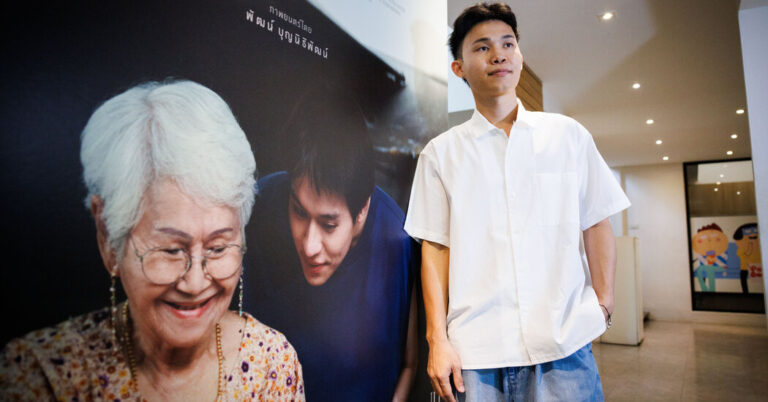Daniel Nico Laudit says he doesn’t cry easily. He decided to test his mettle this month at a movie theater in Manila and documented his experience for his 4.5 million followers on TikTok.
Before the screening, he filmed himself dancing and beaming and said to the camera, “Me before watching ‘How to Be a Millionaire Before Grandma Dies.’ » About two hours later, he I downloaded a very different version of himself: wiping tears from his eyes in a bathroom.
“I went straight to the bathroom after the movie because I wanted to scream out loud,” Mr. Laudit, 24, a content creator, said in a telephone interview. He said he cried again when he got home.
Reactions like Mr. Laudit’s made the film, shot in Bangkok primarily in the Thai language, a runaway success throughout Southeast Asia. In the Philippines, tickets sold out on opening day, cinemas had to add more screenings to meet demand, and one chain began handing out tissues to moviegoers. In Singapore, it topped the box office from June 6 to 9. In Indonesia, it attracted millions of viewers. In Thailand, it is the most profitable title of the year so far.
The plot revolves around an aimless and jobless young man, M, whose only ambition is to live stream his games online. He volunteers to care for his maternal grandmother after discovering she has stage 4 cancer. His motivation is not filial piety; instead, he hopes to inherit her house.
After M moves in with his grandmother, he develops a deeper understanding of the complex characters who make up his Thai-Chinese family: Chew, his long-suffering mother who feels that only she can care for her mother; Soei, the youngest good-for-nothing uncle who borrows and steals from the grandmother; and Kiang, the older uncle preoccupied with his daughter and his materialistic wife.
“It’s about what we all have in common, which is family,” said Pat Boonnitipat, the film’s director.
This part of the world is “familiar with many generations living in the same house. I think this kind of education creates a unique feeling in your memory,” Mr. Pat, 33, said.
The film explores the tensions that arise in a family before the imminent death of one of the heads of the family and the gender bias that persists. In a memorable line, Chew says, “Sons inherit the house, daughters inherit the cancer.” »
The grandmother, or “Ah Ma”, played by first-time actress Usha Seamkhum, is brusque and bristling, although viewers quickly realize that beneath this tough exterior, she deeply loves her family members and she feels alone. Many viewers said they loved the chemistry between Ms Usha and her co-star Putthipong Assaratanakul, who plays the grandson.
Mr Putthipong, better known by his nickname Billkin, is famous in Thailand as a television actor and pop star.
“The strength of this film lies in the storytelling and how it draws the audience into the story, allowing them to compare the story of the film with their own personal lives,” said Angeline Kartika, 24, creator of contained in Jakarta, the capital. from Indonesia. She saw the film last month.
Like many viewers, Joy Ni Ni Win, a digital marketing manager in Mandalay, Myanmar’s second-largest city, said she heard about the film on TikTok.
“It piqued my interest to see, ‘OK, why are people crying so hard?’” Ms. Joy, 28, said.
She quickly understood. Just after the end credits of the film, a friend I filmed it at the theater with tears streaming down her cheeks.
Diana Setiawati, who watched the film in Yogyakarta, Indonesia, said it made her think about spending too little time with her mother. After the movie finished, she immediately called her.
“How to Make a Million Before Grandma Dies” is the first feature film by Mr. Pat, a self-taught filmmaker who previously worked in television. It is an unusual success in Thailand, he said, where horror and comedy films typically dominate the box office. The film will be screened at New York Asian Film Festival in July.
The film is based on a screenplay by Thodsapon Thiptinnakorn, a renowned screenwriter. Mr. Pat developed it, drawing on his own experiences. Her maternal grandmother, now 92, was diagnosed with stage 4 breast cancer 20 years ago. She helped raise him and the two still live together. He also added other characters, based on his Cantonese mother’s family, describing the portrayal as “exactly the same, same dialogue”.
They resonated with viewers like Shirley Low, marketing director of Golden Screen Cinemas in Kuala Lumpur, Malaysia’s capital.
“Everything was like, ‘Oh, my God, this is like my family,'” she said, adding that her company didn’t expect the film to be a big hit because it was in Thai. .
“We could never have predicted the conversations around this,” she said.
In Manila, Ruby Ann O. Reyes, vice president of corporate marketing at SM Supermalls, said her company’s cinemas were handing out tissues to moviegoers. Employees were also present in the theater to hand out more tissues during the “heartbreaking parts.”
“Filipinos love to learn real-life lessons from every movie they watch, such as caring for their grandmother and apologizing while she is alive,” Ms. Reyes said.
Ian Jeevan, 27, a financial consultant in Singapore, said the film reminded him of his relationship with his grandmother. He uploaded a TikTok video of himself choking, with the caption: “Running to hug my grandma now!!”
Muktita Suhartono And Rin Hindryati reports contributed.


